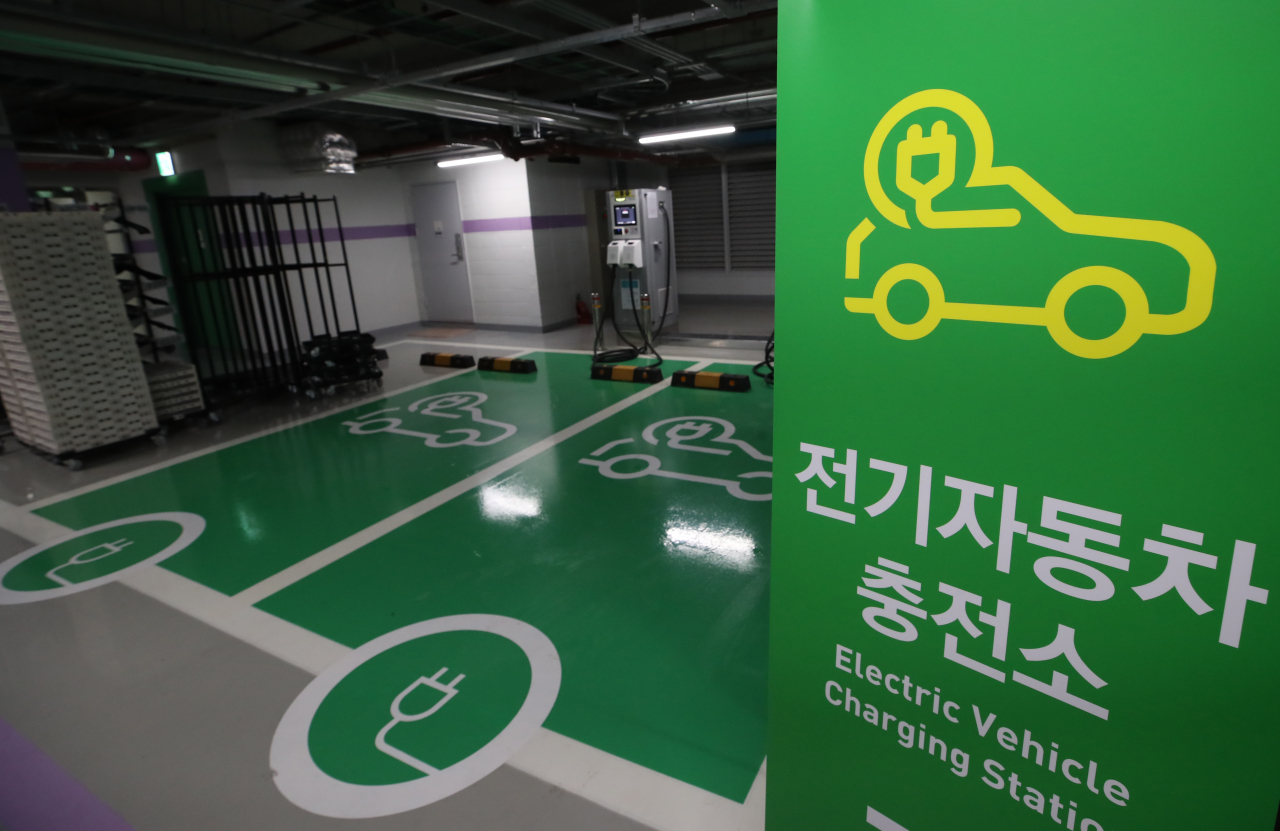Environment Ministry’s deal with platform service providers could cause monopoly: lawmaker
Rep. Noh Woong-rae criticizes MOU between Environment Ministry, Kakao, T Map on sharing information of electric car chargers
By Kan Hyeong-wooPublished : Oct. 5, 2021 - 14:44

Rep. Noh Woong-rae of the Democratic Party on Tuesday denounced a memorandum of understanding signed by the Ministry of Environment, Kakao Mobility and T Map Mobility, claiming that the deal could result in a monopoly of electric car charger information.
On July 29, the Environment Ministry and the two platform service providers inked the MOU to provide smart service of electric car chargers for the public by sharing information on electric vehicles and their owners over the next five years.
During Tuesday’s parliamentary audit of the Environment Ministry, Noh said the troubling part of the agreement is that it hands over the authority to operate and manage various payment services of electric car chargers to Kakao Mobility and T Map Mobility.
“If Kakao and T map monopolize the system of electric car chargers’ payment and reservation under the MOU, the information related to using electric car chargers and payment will be monopolized by them,” the lawmaker said.
According to Noh’s office, on the same day the MOU was signed, the government announced its plan to transfer the operation and control of electric car chargers to the private sector in phases from 2024. The ministry’s MOU with the private platform businesses contradicted the government’s plan, the lawmaker said.
Noh added that even though Kakao and T Map had contributed nothing to setting up the infrastructure for electric car chargers, the Environment Ministry had suddenly donated the system to the platform businesses.
According to the lawmaker’s office, the Environment Ministry’s budget used on installing electric car chargers over the last five years was estimated at about 250 billion won ($210 million) and there were a total of 5,681 electric car chargers operated by the ministry across the country as of July.
Noh said he cannot understand why the Environment Ministry is further encouraging monopoly at a time when putting the brakes on the expansion of the octopus-style operations of platform businesses is not enough.
“In the country that received international praise for passing the world‘s first ‘Anti-Google law,’ the ministry’s decision is giving preferential treatment to big companies,” the lawmaker said.
“The unfair MOU that just gave the infrastructure of electric car chargers to giant platform businesses without any public recruitment or bidding should be immediately withdrawn.”
On July 29, the Environment Ministry and the two platform service providers inked the MOU to provide smart service of electric car chargers for the public by sharing information on electric vehicles and their owners over the next five years.
During Tuesday’s parliamentary audit of the Environment Ministry, Noh said the troubling part of the agreement is that it hands over the authority to operate and manage various payment services of electric car chargers to Kakao Mobility and T Map Mobility.
“If Kakao and T map monopolize the system of electric car chargers’ payment and reservation under the MOU, the information related to using electric car chargers and payment will be monopolized by them,” the lawmaker said.
According to Noh’s office, on the same day the MOU was signed, the government announced its plan to transfer the operation and control of electric car chargers to the private sector in phases from 2024. The ministry’s MOU with the private platform businesses contradicted the government’s plan, the lawmaker said.
Noh added that even though Kakao and T Map had contributed nothing to setting up the infrastructure for electric car chargers, the Environment Ministry had suddenly donated the system to the platform businesses.
According to the lawmaker’s office, the Environment Ministry’s budget used on installing electric car chargers over the last five years was estimated at about 250 billion won ($210 million) and there were a total of 5,681 electric car chargers operated by the ministry across the country as of July.
Noh said he cannot understand why the Environment Ministry is further encouraging monopoly at a time when putting the brakes on the expansion of the octopus-style operations of platform businesses is not enough.
“In the country that received international praise for passing the world‘s first ‘Anti-Google law,’ the ministry’s decision is giving preferential treatment to big companies,” the lawmaker said.
“The unfair MOU that just gave the infrastructure of electric car chargers to giant platform businesses without any public recruitment or bidding should be immediately withdrawn.”


![[AtoZ into Korean mind] Humor in Korea: Navigating the line between what's funny and not](http://res.heraldm.com/phpwas/restmb_idxmake.php?idx=644&simg=/content/image/2024/04/22/20240422050642_0.jpg&u=)


![[Herald Interview] Why Toss invited hackers to penetrate its system](http://res.heraldm.com/phpwas/restmb_idxmake.php?idx=644&simg=/content/image/2024/04/22/20240422050569_0.jpg&u=20240422150649)
![[Graphic News] 77% of young Koreans still financially dependent](http://res.heraldm.com/phpwas/restmb_idxmake.php?idx=644&simg=/content/image/2024/04/22/20240422050762_0.gif&u=)
![[Exclusive] Korean military set to ban iPhones over 'security' concerns](http://res.heraldm.com/phpwas/restmb_idxmake.php?idx=644&simg=/content/image/2024/04/23/20240423050599_0.jpg&u=20240423183955)







![[Exclusive] Korean military to ban iPhones over security issues](http://res.heraldm.com/phpwas/restmb_idxmake.php?idx=652&simg=/content/image/2024/04/23/20240423050599_0.jpg&u=20240423183955)



![[Today’s K-pop] Ateez confirms US tour details](http://res.heraldm.com/phpwas/restmb_idxmake.php?idx=642&simg=/content/image/2024/04/23/20240423050700_0.jpg&u=)